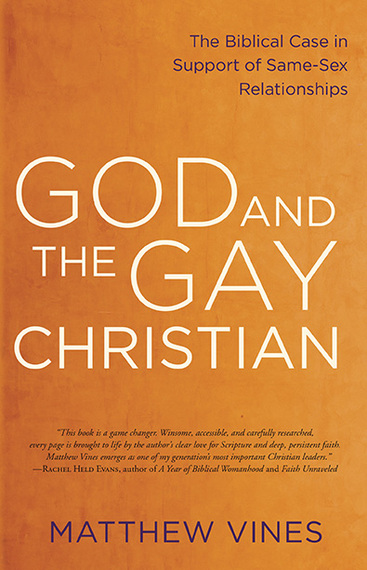When I read Matthew Vines' new book, God and the Gay Christian, I wished my younger self had had this book. I was a closeted gay guy who attended the very conservative, evangelical Church of the Nazarene, which for all intents and purposes is the little brother to the United Methodist Church, both of which are under the Wesleyan-Arminianism faith tradition.
Whenever there is a situation that is hard to reconcile the first place a Wesleyan gets help is from the Bible. But we Wesleyans don't use the Bible alone. We approach the situation using the Wesleyan Quadrilateral, a four-pronged test that helps us make sense of it. The Wesleyan Quadrilateral views the situation in the context of scripture, experience, reason and tradition. Vines' book has put the issue of being a gay Christian perfectly into the framework of the Wesleyan Quadrilateral.
In my many years as a closeted gay, I would secretly read articles about Christianity's view of homosexuality and faith and feel hopeless. The pro-gay texts would negate the importance of scripture and emphasize experience. Which made me feel good because I wasn't being told I was going to hell, but also made me feel heretical because I had to become a Marcionite to get there, which then made me feel like I was going to hell. The anti-gay texts would do the opposite; they negated all my experiences as a gay Christian in order to honor what the Bible says, and I'm back to hell without passing Go.
Vines' book is different. He approaches the topic by placing high value to the role of scripture. The same way Wesleyans view it. He continues to balance that high value of scripture; with his experience of growing up a gay Christian in Kansas; defers to church tradition on its application of celibacy, marriage, and sexual orientation; and walks you through the reason and logic of supporting the case for same-sex marriage. This book could be the new benchmark in which all conversations about Christianity and homosexuality start.
The topic of homosexuality inside the Church is not without controversy. Critics are already saying that Harvard-educated Vines has misused biblical hermeneutics (how scholars interpret the Bible) in order to manipulate his readers. I could write ad nauseam of the clichés and scare tactics opponents are saying about this book. My favorite critique says that Vines wrote the book as part of the larger gay agenda, timed perfectly to "introduce confusion within the evangelical firmament." The Wesleyan Quadrilateral can test claims of the opposition too. How do they look on the backdrop of what we know of scripture on this topic; the experiences voiced by gay Christians; the traditions regarding the treatment of the other; and the reasoning's behind such accusations?
I feel like God and the Gay Christian will have a depolarizing effect on a topic that has become über polarizing for the Church. A part of being Wesleyan means that I have to make room for everyone at the Lord's Table, even those completely in opposition to my stance on same-sex marriage. Doing so unites us. Vines' book lets us make room even for them.
Vines' central theme isn't solely finding Christian blessings of same-sex marriages, but rather our awareness of treating everyone as being created in the image of God. Vines masterfully bankrupts the church's policy of exclusion and blanket celibacy for gays and lesbians by pointing out that we are to called and created be in relationship with one another because God is in relationship with God's self (Father, Son, and Spirit). This lines up perfectly with the Wesleyan doctrine of social holiness. To paraphrase Jürgen Moltmann we are invited to participate in the perichoresis, or the circle dance, with God, and invite others to join.
My hope is that God and the Gay Christian will help people who are struggling to reconcile their personal faith with human sexuality like I was before I came out. Or maybe it will encourage people who are on the fence about this issue to boldly step out and engage in ways that help restore broken relationships and invite more people to the Table, and into the great circle dance.
